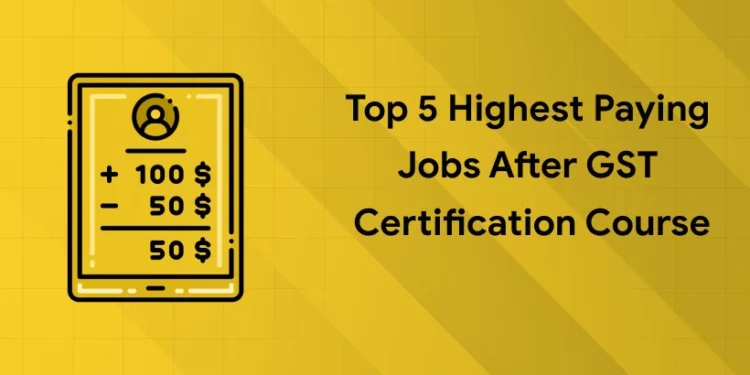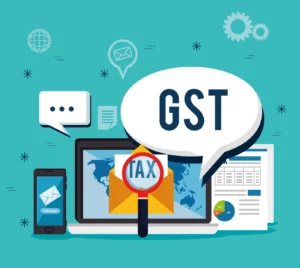Table of Contents
To all the graduates and aspirants out there, this is to bring awareness to you about the way GST has opened the way to a whole different world of professional opportunities. Regardless of whether it is a service or manufacturing industry, almost every organization (small or large) needs to keep up with their respective record books. What’s more, for this reason they require an Accounts Officer, Accounts Director or even Chartered Accountants who have good knowledge and information about GST. In this way, GST certification professionals are in high demand. Top companies include – EY, Capgemini, Times Group Publications and so on.
Check out this video by Entri in Malayalam!
The normal compensation for GST occupation is Rs. 600,000 for each year. In any case, these compensation figures depend on the GST Practitioner salary rates obtained from the various GST Practitioner representatives.
Unlock Your Accounting Potential – Enroll in Our Comprehensive Course Today!
Highest Paying Jobs After GST Certification Course in 2026
With a GST certification course, the GST salary can skyrocket. With the increasing demand for GST, there are many job opportunities that one could take up in GST. Some of them are listed below.
Taxation Manager:
Almost every mid-sized business needs someone to handle their tax issues. Depending on the scale of the organization, this is a senior job. For example, a large firm will have separate managers for direct and indirect taxes.
In addition, the manager will have staff to handle compliance and a consultant to handle complex issues. A person with good representational skills is also essential in case of department notices and other legal matters. Consequently, it is one of the most suitable career options in GST.
The Job Description of a Taxation Manager will be as follows:
- Provide a wide range of tax services in compliance with laws and regulations in a reasonable time frame.
- Develop and interact with clients to provide exceptional planning, advice and knowledge.
- Provide creative tax planning and audit complex tax returns.
- Tax risks must be identified and mitigated.
- Coordination and evaluation of accounting staff
- Manage tax provision processes.
- Processes can be improved by creating or using best practices.
- Tax audits must be managed and coordinated.
- Maintain tax balances in the general ledger.
A tax executive with less than two years of experience can expect to earn around INR 28,600 per month. Someone with two to five years of experience is expected to earn INR 36,100 per month, which is 26% more than someone with less than two years of experience.
Moving forward, someone with five to ten years of experience earns INR 47,600 per month, which is 32% more than someone with two to five years of experience.
Taxation Research Analyst:
This profile is aimed at large corporations. They have sophisticated structures and transactions. For example, an infrastructure company like L&T regularly signs new contracts. They require someone to investigate the business from a tax perspective.
A wrong signature can turn a profitable contract into a losing one. As a result, they are hiring tax analysts. Every new contract and transaction is assessed for taxes. It is included in the contract in case of any potential liability.
A tax analyst should be able to perform the following duties:
- Preparation of transaction tax forms for monthly, quarterly and annual filing of gross receipts, property tax, sales, etc.
- Investigation of transaction tax issues.
- Interpreting and enforcing state, local and international laws, regulations and legislation.
- Preparation for and assistance with transaction tax audits.
- Preparation/analysis of indirect tax submissions for companies.
- Providing advice based on a review of transaction tax rules and regulations.
- Help with transaction tax ledger account reconciliation.
- Creating and implementing process improvements.
A tax analyst with 1-4 years of experience will get an average total GST salary of around 3.5-6 lakhs per annum, while a fresher would get an average of around 3 lakhs per annum.
Tax Reconciliation Accountant:
Large businesses require someone who can reconcile sales, purchases and input tax credits. Entering the wrong data in your GST return can have devastating consequences. Every GST taxpayer is usually required to make the following reconciliation.
- Sales recorded in books, together with sales recorded in GSTR 1 and GSTR 3b.
- Tax paid on declared sales.
- Purchases qualify for an input tax credit.
- GSTR 2b, 2a Input Tax Credit.
- With the bills and items received, claim an input tax credit.
The tax reconciliation accountant must fulfil the following duties:
- Investigate Financial Statements.
- Make Budget Plans.
- Organize Financial Documents.
- Calculating Taxes.
- Accounting System Inspection.
- Communicating with Customers.
On average, a tax accountant with less than 1 year of experience can expect total compensation of nearly 2.5 to 3,000,000 per year. While a tax accountant with higher level of experience can get a GST salary of about 3,00,000 to 7.5 lakh per annum.
GST Compliance Executive
A small business cannot afford to hire full-time staff to ensure GST compliance. They delegate compliance to compliance professionals. Even large corporations outsource their compliance because they don’t want to have a significant crew.
Compliance exercises can be conducted by professionals familiar with compliance. In this case, they are not required to report to anyone. They are able to work autonomously.
A Tax Compliance Manager/Executive is Desired to Perform the Following Operations:
- Manage the organization’s global income and indirect tax compliance to ensure timely submissions.
- Responsible for the preparation of quarterly and annual tax provisions, notices and related information.
- Help with monthly accounting closing.
- Prepare and pay local tax filings and payments.
- Manage tax accounts and internal process controls.
- Assist the foreign accounting team with statutory filings and work with advisors.
- Answer tax audit questions and alerts.
- Monitor changes in global tax legislation and regulations to ensure proper assessment of income tax impact. Collaborate with business partners on ad hoc initiatives and resolve tax related issues.
Based on 107 salaries, an entry-level tax compliance manager with less than a year of experience can expect an average total compensation of nearly 3-4 lakhs per annum.
Unlock Your Accounting Potential – Enrol in Our Comprehensive Course Today!
GST Practitioner
A GST Practitioner is a type of consultant who provides services to other taxpayers through the Internet. A tax preparer is someone who can prepare returns and perform other tasks based on information provided by a taxpayer.
Important Things to Note
The GST Officer should approve the GST Practitioner’s submission after the GST Practitioner has filed the GST return. Registered persons must confirm the GST Practitioner’s return.
Login must send confirmation by e-mail and SMS. If the confirmation is not submitted, the returns filed by the GST operator will be considered final.
A GST practitioner must obtain a GST certification before starting his practice to fulfill all obligations. A GST certification can help increase your GST salary. First of all it has to be registered in the GST registration portal.
The GST Practitioner course helps to strengthen the credibility and trust of taxpayers in the services offered by the GST course in India. For many people, becoming a goods and services tax specialist is a revolutionary and novel employment option. After receiving the authorization from the GST common site, the practitioner can perform the following services.
Requirements to Become a GST Practitioner:
To become a GST practitioner, an applicant must pass the GST Practitioner exam within two years of enrolment. Once you are certified as a candidate, you will be able to do the following.
- First and foremost, you will get a comprehensive overview of GST regulations, including their implementation, compliance and enforcement.
- Then understand how GST affects the functioning of any business. You will also be adept at how it benefits the business process.
- In addition, gain practical knowledge of the many techniques required under the GST Act, such as registration, filing returns, claiming input tax credit, TDS compliance and refunds.
To pass the GST exam, you can take a GST certification course from a valid institution. More than getting the certification, choosing the right institute is also mandatory. GST salary is largely dependent on course completion. Once the candidate completes the course, there is more scope for GST salary increase.
Before starting his career as a GST Practitioner, you must be registered or authorized by the GST website and the GST Network to perform and provide services related to GST compliance (GSTN).
A GST provider may be authorized by a registered company to file a GST return. Once a GST expert is registered with the GST system, taxpayers can request that person to engage them as their expert. On the other hand, the expert has the option to accept or reject the taxpayer’s request.
The educational qualifications of a GST practitioner include:
- Degree in business or related degree.
- Diploma examination from any foreign university recognized by any Indian university as equivalent to a diploma examination with a degree in Commerce, Law, Banking including Higher Auditing or Business Management from any Indian University
- Any other review notified by the Government on the proposal of the Council.
The Requirements for Enrolling:
- A valid PAN card is a must for the candidate.
- Applicant must have a valid mobile phone number.
- There should be a valid email id of the applicant.
- The applicant is expected to have a professional address.
- The applicant must have all the necessary documentation and information.
Eligibility Criteria:
- A tax return preparer or sales tax professional who has been registered for at least 5 years.
- Graduate or Post Graduate in Commerce, Law, Business Management from a recognized Indian or Foreign University.
- Chartered Accountant, Cost Accountant or Company Secretary holding a GST Certification of Practice (COP).
As a fresher, GST intern salary ranges from 0.2 Lakhs to 5.0 Lakhs per annum. As the candidate gains experience, the GST salary increases exponentially.
Organizations such as EY, PWC, Deloitte, KPMG and Grant Thornton are proposing pay rises of 25-30% top executives who agree to transfer to GST groups within the same business.
In general, both salary and mid-term bonuses increase by 20%. The average increase for the Big Five is roughly 12%. The GST Practitioner course helps immensely in increasing your GST salary.
Who Should Learn GST?
1: Accounting provides information on
- Professionals who focus on solving tax compliance issues.
- Graduates and Post Graduates who want to enhance and showcase their GST Compliant skills
- Fresher focus on careers in finance, banking and accounting
- Individuals who intend to help their clients understand taxation under the GST Act.An official who is
- involved in the new tax regime and the calculation of tax liability
- Who wants to apply for organizations that require GST training
- Accountants who want to update their GST tax and accounting reforms
Placement Oriented PWC Business Accounting Course
PWC Certified Business Accounting Course by Entri App: Master in-demand skills, ace interviews, and secure top-tier jobs.
Join Now!Career Opportunities: GST courses
All the professionals and job seekers will get an understanding about the manner in which GST has opened the way to a completely different world of job offers.
Be it a duty or a manufacturing industry, almost every institution has to maintain relevant books of records. What’s more, because of this, those with good GST knowledge and information have plenty of opportunities for GST Certified Professionals in top companies and organizations – EY, Capgemini, Times Group Publications and many more.
The normal compensation offered by GST and this income depends on the GST Practitioner pay rates as determined by the various GST Practitioner Course representatives
Various divisions are most affected by the use of GST and these businesses include – Automobiles, Logistics, E-business, Media, Home Decoration and Entertainment or some others. In the event that you wish to improve your professional prospects, at this point GST accreditation courses are a significant goal of thought.
Keep in mind that during the interviews recruiters will generally focus on the level of understanding and certification. When you are not certified in any field, it is advised to make a decent decision to go for an accreditation policy in your field of interest or even a GST course online. Then attempt the registration procedure which will undoubtedly increase your chances of being recognized by the organizations.
Unlock Your Accounting Potential – Enroll in Our Comprehensive Course Today!
Conclusion: Unlock your career now!
The demand for GST-certified professionals is rapidly increasing in 2026 and will continue to increase in the coming years. The main reason is that businesses rely on tax-compliant and efficient financial practices. The top-paying jobs not only offer high pay but also an impressive career growth. Whether you’re a recent graduate or an experienced professional looking to upskill, this certification can open doors to a range of rewarding career opportunities.
If you feel like taking up a GST course, check out Entri’s GST Certification Course. With industry experts as mentors and top-notch materials, you are bound to be a master of GST. Enrol now and kickstart your career!
Placement Oriented PWC Business Accounting Course
PWC Certified Business Accounting Course by Entri App: Master in-demand skills, ace interviews, and secure top-tier jobs.
Join Now!Frequently Asked Questions
Can I get job after GST course?
Government organizations also require professionals with expertise in managing accounts and taxation. Graduates of the Tally GST course can explore job opportunities in government departments such as customs, excise, income tax, or sales tax.
What is the salary after GST course?
GST Practitioner salary in India with less than 1 year of experience to 8 years ranges from ₹ 0.4 Lakhs to ₹ 6.0 Lakhs with an average annual salary of ₹ 2.4 Lakhs based on 167 latest salaries.
What is the scope of GST certification?
It exposes a plethora of job opportunities career-wise. You’ll either work as a practitioner or work for businesses. You’ll even open up a consultancy. Also, a GST-certified professional can expect a mean 15% hike in salary.
















